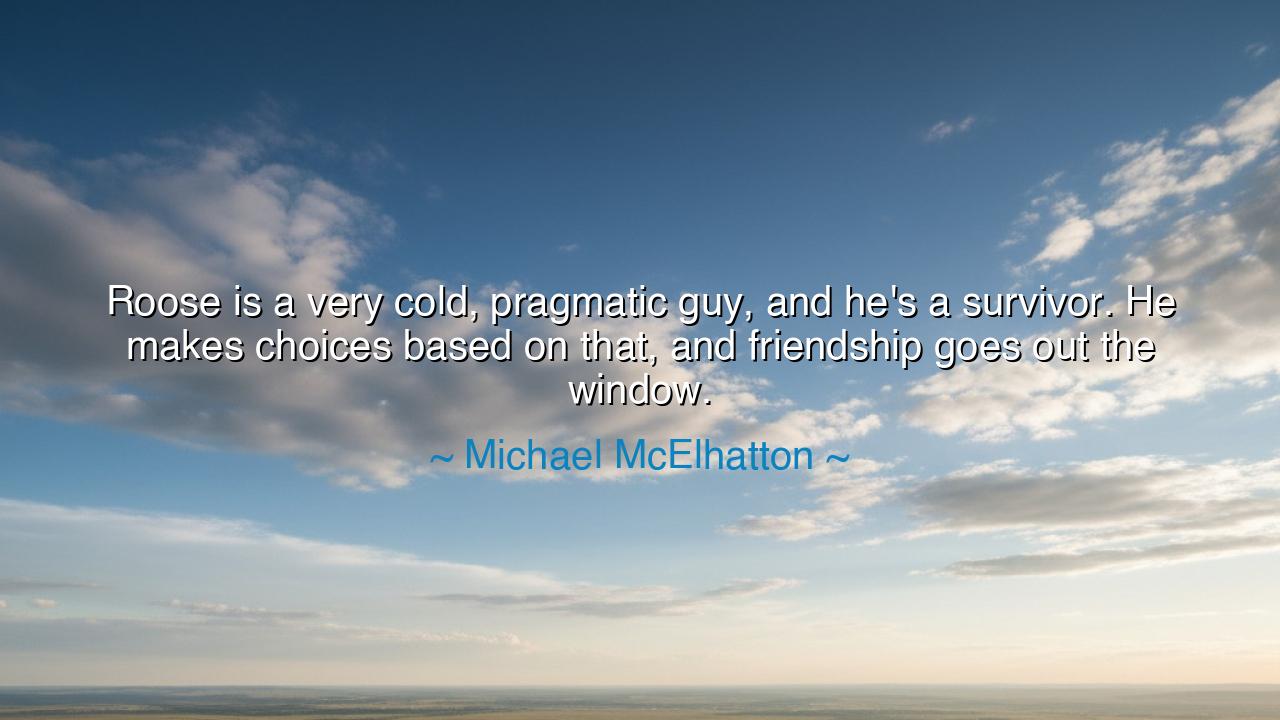
Roose is a very cold, pragmatic guy, and he's a survivor. He
Roose is a very cold, pragmatic guy, and he's a survivor. He makes choices based on that, and friendship goes out the window.






In the vast tapestry of human existence, there are moments when the bonds of friendship are tested by the harsh realities of survival, duty, and self-preservation. The words of Michael McElhatton, "Roose is a very cold, pragmatic guy, and he's a survivor. He makes choices based on that, and friendship goes out the window," reveal a timeless and poignant truth: when the pursuit of survival becomes paramount, even the most cherished relationships may be sacrificed on the altar of self-interest. McElhatton’s portrayal of Roose, a character who places survival above all else, speaks to the deep and often painful truth that in life’s most trying moments, survival may demand a cold pragmatism that pushes aside everything—even friendship.
The ancients too understood the tension between loyalty and self-preservation. In Homer’s great epic, The Iliad, we see the mighty Achilles, whose bond of friendship with Patroclus is one of the central emotional cores of the story. Yet, despite the depth of their friendship, Achilles is forced to make choices based on his own honor and pride in battle. When Patroclus falls in the heat of war, Achilles’ grief is immense, but his initial reluctance to return to the fight stems from the fact that he sees his survival and his honor as the greatest stakes of all. In Achilles’ mind, the pursuit of personal glory—the survival of his name—outweighs the desire to act out of love for his friend. This is a classic example of the difficult decision between friendship and self-interest, and the tragic consequences that can follow when pragmatism overrides the bonds that should hold us together.
Likewise, the story of Julius Caesar, one of history’s most iconic figures, echoes the theme of survival over loyalty. Caesar’s relationship with his friend, Brutus, is one of profound complexity and ultimately tragic betrayal. Despite their close friendship, Caesar’s political ambitions and his desire to secure his empire ultimately lead to him making decisions that alienate even those closest to him. In the end, Brutus—a man whom Caesar once considered a friend—betrays him, and Caesar’s final words, "Et tu, Brute?" reflect the deep sorrow of a friendship destroyed by the cold realities of power and survival. The bond of friendship, in this instance, is shattered by the choices that must be made to secure personal and political survival. Pragmatism, for Caesar, overrides the loyalty to a friend.
McElhatton’s description of Roose as a “cold, pragmatic guy” reflects the ancient tension between loyalty and survival—a tension that has existed for centuries in the hearts of leaders, warriors, and common folk alike. Survival often demands ruthlessness, and those who rise to power are often those willing to discard their personal connections to protect their own interests. Consider the story of King David in the Bible, whose rise to power was marked by decisions that put him at odds with his closest companions. David’s pragmatic choices, his maneuvering to secure his throne, ultimately led to the betrayal of friendships and even family ties. His desire for survival and to secure his kingdom was so consuming that it caused fractures in his most intimate relationships, proving that even the strongest bonds can be broken by the sharp edge of self-preservation.
The lesson from McElhatton’s words is one of heart-wrenching realism: when survival is at stake, friendship may no longer be a priority. Roose, like the figures of history and myth, shows us that in some of life’s most extreme circumstances, we may be forced to make choices that leave no room for loyalty or compassion. The world is often a brutal place, and the harsh decisions that must be made in the pursuit of personal safety, ambition, or self-interest may very well lead us to sacrifice those we once called friends.
But there is also a lesson in this truth: survival does not always have to come at the cost of humanity. While it is true that many figures throughout history have chosen self-preservation over loyalty, those who rise above—the true heroes—are the ones who maintain compassion even in their most difficult choices. The self-sacrifice of friendship need not always be the end of loyalty, but perhaps, just as importantly, a testament to the depth of human connection. If survival demands that we break bonds, let us be wise in knowing that true survival comes not from selfishness but from making decisions that preserve our humanity.
In your own life, let pragmatism not overshadow the warmth of friendship or the bonds that bind you to those you love. While survival in difficult times may require hard decisions, remember that even in the face of crisis, it is possible to uphold your integrity and loyalty. Let not the cold winds of self-interest erode the warmth of human connection—for it is the friendship and loyalty that we nurture in times of peace that will give us the strength to endure in times of trial. Choose wisely, choose compassionately, and in doing so, let your choices reflect not just the survival of the body, but the survival of your soul.






AAdministratorAdministrator
Welcome, honored guests. Please leave a comment, we will respond soon